Marchés
Lors de la conception d’une intervention humanitaire et de la prise de décisions quant à l’utilisation des transferts monétaires, l’analyse générale des options de réponse doit inclure une analyse de marché. Il est prouvé qu’offrir un soutien ciblant le fonctionnement des marchés accélère la reprise et accroît la résilience dans les zones affectées par une catastrophe.
De nombreuses organisations ont investi dans la mise au point d’outils visant à faciliter l’analyse de marché et réfléchissent à la mise en place de programmes basés sur les marchés plus holistiques. Elles envisagent des interventions tirant profit du marché (basées notamment sur des transferts monétaires aux populations affectées), ainsi que des interventions soutenant directement les marchés (comme l’octroi de subventions conditionnelles aux vendeurs/euses pour la remise en condition du marché).
Initiatives associées
Contenu associé

1.2 Introduction à l’analyse de marché
Cours
Ce cours de 30 minutes offre une introduction à l’analyse de marché pour les contextes d’urgence. Il contient des contributions d'experts dans ce domaine. Ce cours a été développé en collaboration avec l'International Rescue Committee et le CALP Network et grâce au financement d’USAID/OFDA et de l’Agence Suisse pour le Développement et la Coopération. Il est destiné aux...

2.4 Un guide pratique pour l’analyse de marché
Cours
Ce cours en ligne de 3.5 heures vise à fournir aux équipes qui conduiront des analyses de marchés en contextes humanitaires une compréhension approfondie de la théorie et des étapes à suivre afin de leur permettre de comprendre le pourquoi et le comment du processus à suivre. Les participants seront guides à travers un scenario d'analyse de marchés d'urgence. Ce cours s'appuie sur...
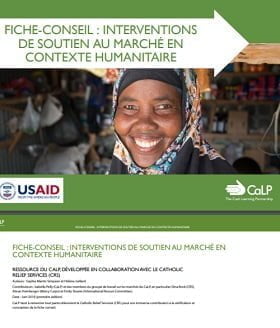
Fiche-Conseil : Interventions de soutien au marché en contexte humanitaire
Guides et outils
La fiche conseil définit le programme de soutien au marché en contexte humanitaire et le décrit dans la pratique. Elle permet aux praticiens humanitaires d’envisager systématiquement des interventions de soutien au marché, parallèlement à d’autres activités du programme. Le champ d’application comprend des interventions de soutien au marché axées sur l’offre/la disponibilité...
Thematic lead
Latest

Guidance to Partners Funded by ECHO to Deliver Medium to Large-Scale Cash Transfers in the Framework of 2017 HIPs and ESOP
Guidelines and Tools
The use of multi-purpose cash transfers as a central component of humanitarian assistance is becoming increasingly important, in particular in the context of protracted crises in middle-income countries. Whilst an instrument such as the ESSN (Emergency Social Safety Net) in Turkey certainly represents an...

Using Cash and Vouchers in Somalia in 2017: The Need to Build on Learning from the 2011-12 Somalia Drought Response
Report
During the 2011-12 drought response in Somalia, cash and vouchers were distributed at scale – a response that was unusual in such a context at that time. In 2017 cash is accepted as highly appropriate and is a major part of response plans. While it may not always be possible to apply all best...
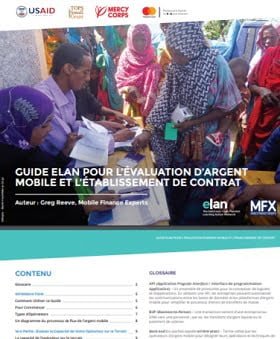
Guide ELAN pour l’évaluation d’argent mobile et l’établissement de contrat
Guides et outils
L’argent mobile offre le potentiel énorme de permettre des transferts d’argent liquide à l’échelle et de relier des participants de programme à des services financiers. Fréquemment, cependant, les professionnels humanitaires ont des difficultés à comprendre la terminologie liée à l’argent...

Aid in context: the importance of market-based approaches to aid delivery in northern Syria
Report
With the Syrian conflict now in its seventh year, 13.5 million Syrians need humanitarian aid. But aid in northern Syria focuses inflexibly on food kits that are expensive to administer, designed to satisfy short-term needs.
Many people sell their food aid to pay for other urgent needs. This
undermines...
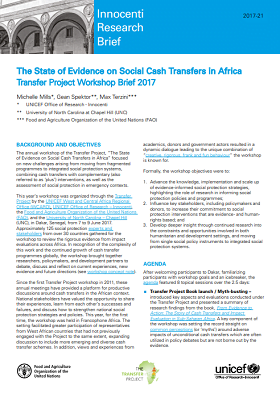
The State of Evidence on Social Cash Transfers in Africa. Transfer Project Workshop Brief 2017
Report
The annual workshop of the Transfer Project, “The State of Evidence on Social Cash Transfers in Africa” focused on new challenges arising from moving from fragmented programmes to integrated social protection systems, combining cash transfers with complementary (also referred to as ‘plus’)...
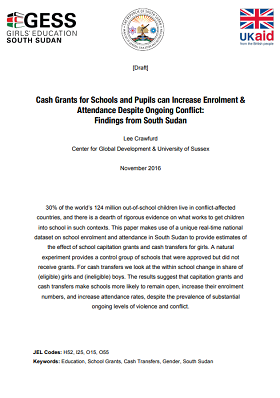
Cash Grants for Schools and Pupils can Increase Enrolment & Attendance Despite Ongoing Conflict: Findings from South Sudan
Report
This paper makes use of a unique, real-time national dataset on school enrolment and attendance in South Sudan to provide estimates of the effect of school capitation grants and cash transfers for girls.
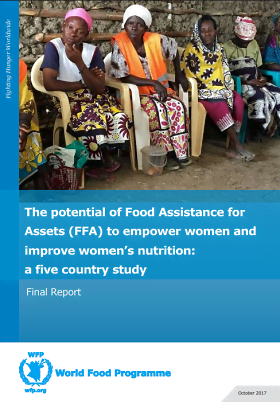
The Potential of Food Assistance for Assets (FFA) to Empower Women and Improve Women’s Nutrition: a five country study
Report
From June 2016 to April 2017, a five-country study to explore the potential of WFP’s Food Assistance for Assets (FFA) programmes to empower women and improve women’s nutrition was conducted by WFP. The purpose of the study was to: 1. Assess changes (outcomes or impacts) that relate to women’s...
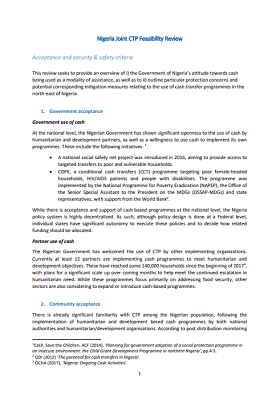
Nigeria Acceptance And Safety Assessment
Guidelines and Tools
This review seeks to provide an overview of i) the Government of Nigeria’s attitude towards cash being used as a modality of assistance, as well as to ii) outline particular protection concerns and potential corresponding mitigation measures relating to the use of cash transfer programmes in the

Cash Transfers for Refugees – An Opportunity to Bridge the Gap Between Humanitarian Assistance and Social protection
Report
The world is now experiencing the biggest refugee crisis since the second world war. Many of the countries with the highest outflow of refugees are facing ongoing conflicts that are unlikely to end anytime soon. In fact, most displacement crises are protracted, with 80% lasting ten years or more. The...
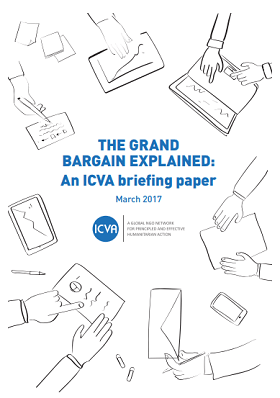
The Grand Bargain Explained: An ICVA Briefing Paper
Guidelines and Tools
ICVA, a global network of humanitarian NGOs dedicated to principled and effective humanitarian action, has created this Grand Bargain briefing paper to support NGOs (and all humanitarian actors) better understand and engage in the Grand Bargain. This briefing paper forms part of ICVA’s humanitarian...

Time for Change: Harnessing the Potential of Humanitarian Cash Transfers
Report
This synthesis report examines the effectiveness of humanitarian cash transfers in Ukraine, Iraq, the Democratic Republic of the Congo (DRC), Mozambique and Nepal. These case studies are building on the work of the High Level Panel on Humanitarian Cash Transfers. The Panel concluded that cash transfers...
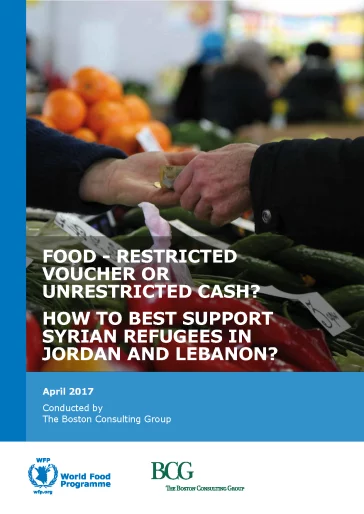
Food – Restricted Voucher or Unrestricted Voucher Cash? How to Best Support Syrian Refugees in Jordan and Lebanon?
Report
The World Food Programme (WFP) plays a pivotal role in the food security of Syrian refugees within the Syria +5 region. WFP periodically reviews its operational approach, so it is timely to consider what the best modality for the next phase of the response might be, including the pros and cons of...

The Livelihood Impacts of Cash Transfers in Sub-Saharan Africa: Beneficiary Perspectives from Six Countries
Report
Cash transfers (CTs) are a social protection mechanism to reduce the poorest households’ vulnerability to shocks and build human
capital by smoothing consumption and sustaining expenditure on education and social welfare.
This study examines whether and how CTs go beyond welfare objectives to promote...
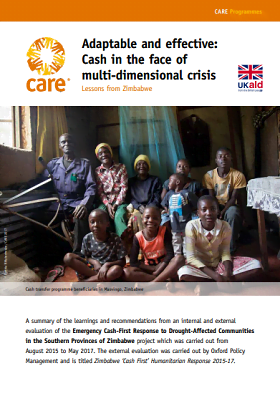
Adaptable and effective: Cash in the face of multi-dimensional crisis
Report
A summary of the learnings and recommendations from an internal and external evaluation of the Emergency Cash-First Response to Drought-Affected Communities in the Southern Provinces of Zimbabwe project which was carried out from August 2015 to May 2017. The external evaluation was carried out by Oxford...
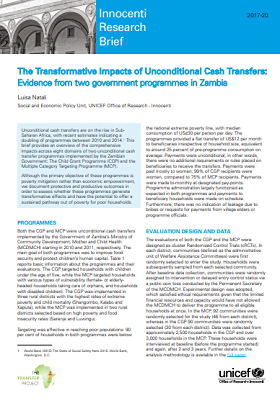
The Transformative Impacts of Unconditional Cash Transfers: Evidence from two government programmes in Zambia
Report
Unconditional cash transfers are on the rise in Sub-Saharan Africa, with recent estimates indicating a doubling of programmes between 2010 and 2014.This brief provides an overview of the comprehensive
impacts across eight domains of two unconditional cash transfer programmes implemented by the...

Scaling up CTP in Somalia: A focus on: CTP options in a changing funding landscape and Improving the use of lesson learning
Report
This report summarises discussions that took place during a half-day event in November 2017. The event built on discussions in September during which a myriad of issues were highlighted and many opportunities for collective action noted. This meeting focused on a more in-depth discussion on two issues...

Renforcer L’Utilisation des Transferts Monetaires Multisectoriels en Afrique de L’Ouest
Rapport
En décembre 2017, le CALP Network et IRC se sont réunis pour organiser un atelier d’apprentissage de deux jours afin d’harmoniser et de partager les expériences des pays travaillant sur la définition du panier de dépense minimum et de combler les lacunes existant sur l’analyse de marché, qui...

Enabling Digital Financial Services in Humanitarian Response: Four Priorities for Improving Payments
Guidelines and Tools
The humanitarian sector is increasingly turning to digital payments to distribute cash-based aid, but many efforts remain fragmented around custom built solutions that miss opportunities to build strong, enduring pathways to financial inclusion and resilience for crisis-affected populations. Few solutions...

Challenging the System: Humanitarian Cash Transfers in Iraq
Report
Cash transfers have been used in Iraq to meet the critical basic needs of a highly vulnerable population, providing them dignity and flexibility in a context of uncertainty and economic need. Although Iraq is an appropriate context for the use of cash transfers, factors including government acceptance,...

Effects of Unconditional Cash Transfers on the Outcome of Treatment for Severe Acute Malnutrition (SAM): A Cluster-Randomised Trial in the Democratic Republic of the Congo
Report
Cash transfer programs (CTPs) aim to strengthen financial security for vulnerable households. This potentially enables improvements in diet, hygiene, health service access and investment in food production or income generation.The effect of CTPs on the outcome of children already severely malnourished...
